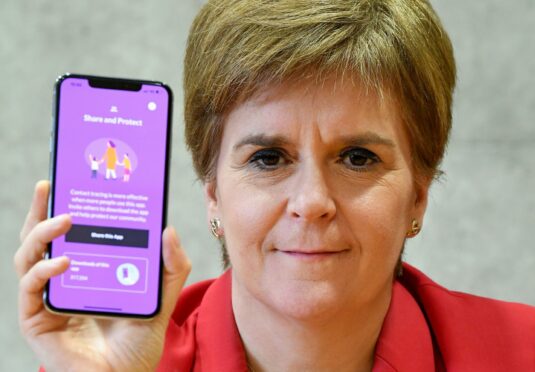
A growing number of Scots are deactivating the mobile phone app that automatically asks them to isolate if they have been a close contact of a Covid carrier.
Figures obtained by The Sunday Post show almost 14,000 deregistered Protect Scotland in the past 12 weeks, with numbers rising month on month.
An average of 1,100 contacts a week have been traced since the app – which cost £450,000 to develop – was launched 10 months ago.
The Scottish Government says the app is working well, despite only 50,000 people being told to isolate by the Scottish app compared to the app in England where half a million isolation alerts were issued last week.
In April, 2,583 people deregistered Protect Scotland, in May it was 4,220 and in June it was 7,168.
However, the number of people no longer using the app is likely to be far higher because the Scottish Government only has figures for those who deregister the app, who include NHS staff, and it said it is not possible to know how many have deleted it.
Emergency wards: Doctors reveal Scotland’s A&E is understaffed, overworked and on the brink
Lib Dem health spokesman Alex Cole-Hamilton MSP said: “People are deleting the app because they’re worried that, even if they test negative for the virus, they will still be forced to isolate repeatedly. For some this could mean struggling to put food on the table.
“Now that the vaccine is helping us to turn the tide against the virus, the Scottish Government should put in place a test and release system to allow those who are pinged by the app but test negative to go about their business.
“The Scottish Government also needs to make it far easier for people who are isolating to access financial support. That would mean people would be less likely to push the limits of the system.”
The app, which uses Bluetooth technology to alert people who have been a close contact of someone who has recently tested positive for Covid, has been hailed as a success by ministers with about two million downloads to date.
The Scottish Government said: “To protect people’s confidentiality, the app is quite rightly anonymous and it is therefore not possible to determine the number of people who have deleted rather than deregistered.”

Enjoy the convenience of having The Sunday Post delivered as a digital ePaper straight to your smartphone, tablet or computer.
Subscribe for only £5.49 a month and enjoy all the benefits of the printed paper as a digital replica.
Subscribe